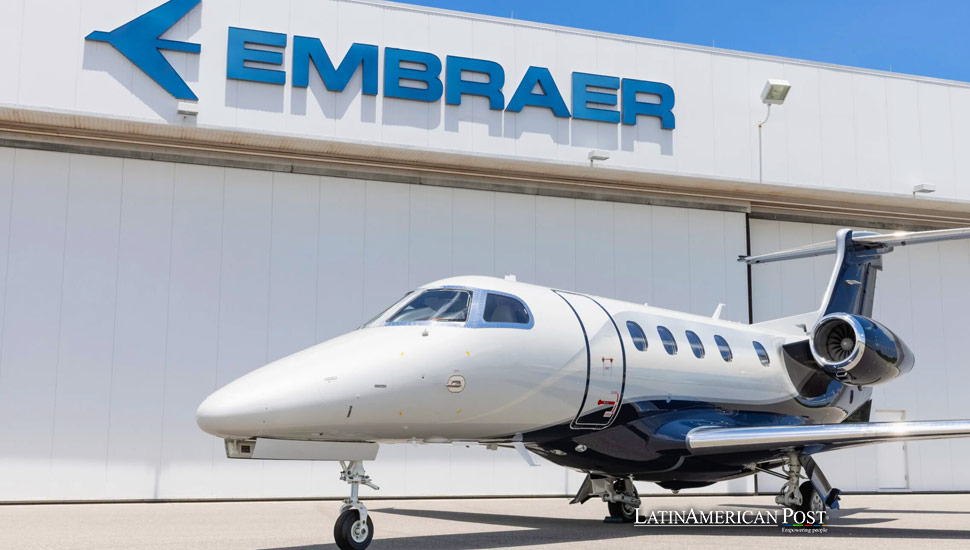Brazil’s Electric Aircraft Maker Plans Funding for Certification and Expansion

Brazilian electric aircraft maker Eve is gearing up to raise funds next month to support the certification of its flying taxi by 2026. The company aims to solidify its position in the burgeoning urban air mobility sector.
In a strategic move to advance its urban air mobility ambitions, Eve, the electric aircraft maker majority-owned by Brazilian aerospace giant Embraer, is planning to secure additional funding by next month. This financial boost is intended to support the certification process of its electric vertical takeoff and landing (eVTOL) aircraft, which is expected to be certified and operational by 2026. The company’s CEO, Johann Bordais, shared these developments in an exclusive interview with Reuters.
Eve has sufficient cash and credit facilities to sustain its operations until 2025. However, with the certification and market entry scheduled for 2026, additional funds are necessary to ensure the company meets its ambitious timeline. Bordais did not disclose the amount Eve intends to raise or the fundraising method. Still, the need is evident as the company aims to secure its financial footing through this critical certification phase.
Eve debuted on the New York Stock Exchange in May 2022, raising approximately $400 million to fund the development and production of its eVTOL aircraft. Initially initially projected to cost $540 million, the project received an additional boost with a 490 million-real ($92 million) facility from Brazil’s state development bank, BNDES. As of the end of this year’s first quarter, Eve’s total liquidity stood at $280 million.
“We are doing well in terms of cash,” said Bordais, who took over the company in September. “Our goal with this second round of fundraising is to guarantee financial stability through certification.”
Advancements in eVTOL Development
Eve is among the many startups globally working on battery-powered aircraft capable of vertical takeoff and landing designed to transport passengers on short city trips. The company has garnered substantial interest, securing orders from clients in Brazil, the United States, India, and France. Notable companies that intend to purchase Eve’s eVTOLs include United Airlines, Global Crossing, Air X, and aircraft lessor Azorra.
The development of Eve’s eVTOL aircraft is progressing on schedule. The company recently unveiled images of its first full-scale prototype, which it plans to test without a crew by the end of the year. Ground tests for this prototype are set to commence in July, following successful wind-tunnel tests last year.
Certification remains Eve’s most critical milestone. The company applied for certification from Brazil’s civil aviation regulator in 2022, expecting this to be followed by approval from the U.S. Federal Aviation Administration (FAA). Maintaining the 2026 certification timeline has been a priority for Eve, and analysts at Jefferies recently highlighted this consistency as a rarity in the sector, noting the company’s strong financial position.
Eve has already secured nearly 3,000 orders and finalized agreements with most component suppliers, with 90% of its supply chain budget established. “But it all starts with certification,” Bordais emphasized.
Manufacturing and Future Prospects
Eve’s first manufacturing plant will be located in Taubate, Brazil, chosen for its proximity to major transportation routes and Embraer’s headquarters in neighboring Sao Jose dos Campos. In its initial phase, the Taubate facility is expected to produce up to 120 eVTOLs per year, eventually ramping up to an annual capacity of 480 aircraft.
While a potential new factory abroad is under consideration, it is not a current priority. “Let’s start with this factory in Taubate, produce and deliver,” Bordais stated, hinting that the U.S. could be a future option.
Eve’s ambitious plans are set against Brazil’s rich aerospace history. Embraer, its parent company, has been a significant player in the global aviation industry since its founding in 1969. It is known for its regional jets and executive aircraft. Embraer’s innovation and success have positioned Brazil as a critical player in the global aerospace market, and Eve’s development of eVTOLs represents the next frontier in this legacy.
Urban air mobility is gaining traction worldwide, with cities increasingly looking towards eVTOLs as a solution to traffic congestion and pollution. Latin America, with its densely populated urban centers and traffic issues, stands to benefit significantly from the adoption of eVTOL technology. Brazil’s leadership in this emerging sector could pave the way for broader regional adoption, enhancing connectivity and efficiency in urban transportation.
Global Collaboration and Industry Impact
Eve’s international collaborations highlight the global nature of the eVTOL industry. By engaging with clients and partners across different continents, Eve is expanding its market reach and contributing to the worldwide discourse on sustainable urban transportation. The company’s efforts align with broader trends toward electrification and decarbonization in the aviation industry, which are crucial for meeting international climate goals.
Eve’s journey towards the certification and production of its eVTOL aircraft is a testament to its strategic vision and commitment to innovation. Eve is poised to become a significant player in the urban air mobility sector by securing additional funding and maintaining a rigorous development schedule. The company’s efforts reflect a broader trend in Latin America towards embracing cutting-edge technologies and contributing to global advancements in sustainable transportation.
Also read: Brazilian Court Denies X’s Request to Exempt Subsidiary from Legal Responsibility
As Eve progresses towards its 2026 certification goal, its success will enhance Brazil’s position in the global aerospace market and set a precedent for other Latin American countries to follow. With substantial financial backing, strategic international partnerships, and a clear vision for the future, Eve is well on its way to transforming urban transportation in Brazil.




